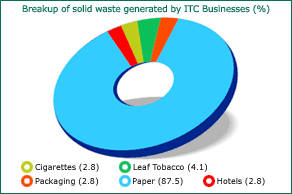| « | » |
|
| |
Towards Zero Solid Waste |
Urban India alone generates an estimated 48 million tonnes of solid waste each year. More
than 25% of the municipal solid waste is never collected for clearance. 70% cities lack
adequate transportation facilities for garbage disposal and there are no sanitary
landfills. The situation in semi-urban and rural areas is even more challenging. |
ITC endeavours to recycle all solid wastes from its manufacturing units and hotels.In
2005-06, the total solid waste generated by ITC units amounted to 3,14,585 tonnes
(2,80,891 tonnes in 2004-05). Although the Leaf Tobacco and the Paperboards &
Specialty Papers businesses achieved 19% and 6% reduction in specific wastes (waste per
unit of production), respectively, a very substantial growth in all ITC businesses led to
12% higher generation of solid waste.
|
 |
| The 3,14,585 tonnes of solid waste includes 13,653 tonnes of
hazardous solid waste (bio-medical wastes, used lead acid batteries, 13,273 tonnes of
sludge from the effluent treatment plants and certain empty containers - designated
hazardous by Indian statutes). Bio-medical waste, in accordance with Bio-Medical Waste
Rules, is sent to authorised incineration facilities; used lead acid batteries are
returned to the original manufacturers/suppliers, for recycling, in accordance with
Battery Management Rules; sludge from effluent treatment plants, the largest component of
hazardous waste, is recycled to make trays, etc. and empty containers of hazardous
materials, after decontamination, are returned to original suppliers/recyclers. ITC
units also generated 251 tonnes of used oil from lubrication and maintenance activities of
various machinery. This used oil was sold for recycling to authorised dealers in
accordance with the Hazardous Waste (Management and Handling) Rules.
|
|
| « | » |
| |
